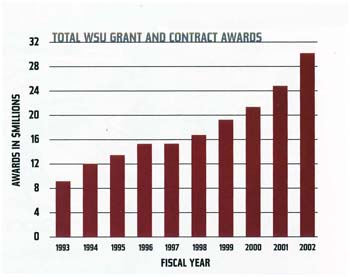 This academic year a number of WSU faculty and staff are working on key research projects and developing important training and service programs, thanks to grants and contracts from federal agencies and the private sector totaling $30,111,238. This total for fiscal year 2002 represents a 17.6 percent increase over the amount of money awarded in the last fiscal year. (Incidentally, 2002 is the ninth consecutive year WSU has seen an increase in external funding.)
This academic year a number of WSU faculty and staff are working on key research projects and developing important training and service programs, thanks to grants and contracts from federal agencies and the private sector totaling $30,111,238. This total for fiscal year 2002 represents a 17.6 percent increase over the amount of money awarded in the last fiscal year. (Incidentally, 2002 is the ninth consecutive year WSU has seen an increase in external funding.)
“This increase is a tribute to research administration and faculty. It represents a trend in funding that WSU is actively pursuing,” reports Dr. Robert Kindrick, vice president of academic affairs. “External funding provides employment for students. It broadens their horizons and gives faculty the chance to pursue research that brought them to the university. It stimulates curiosity.”
Specific contracts and grants include $249,983 awarded to James Locke, associate professor of aerospace engineering, for continuing research on a project with the Federal Aviation Administration.
Ultimately, the data on aging aircraft and metal fatigue being collected will be incorporated into an FAA advisory document. Another example is the $35,980 awarded to Michael Rogers, assistant professor of kinesiology and sport studies, to study the effects of certain herbal compounds in the promotion of energy, strength and immune function in older individuals.
Dr. Gerald Loper, associate vice president for research, believes the overall increase in funding represents a high level of confidence from federal agencies and the private sector.
“The large increases in external funding over the last two years indicate the commitment of the WSU faculty and staff to research and other sponsored programs, and validate the designation of WSU as one of the state’s three research universities,” he says. “Faculty and staff are doing all the right things to increase external funding — developing new ideas, submitting more and better proposals, and collaborating with other universities, industries and community organizations.”
One of the largest awards was made to Don Nance, director of the university’s Counseling and Testing Center, who received a $796,597 contract from the Department of Social and Rehabilitation Services to design and deliver training to providers of mental health services targeted for Medicaid-eligible children with serious emotional disturbances and their families.
“Our training,” Nance says, “is based on a model that emphasizes home and community-based services. It’s strength-based: we empower families and clients. We empower the case managers and the case manager supervisors.
It’s not university staff in their ‘ivory tower’ telling people how to do the job.” Noting that Kansas is a national leader in the area of mental health community care, he adds, “Our attitude is not to institutionalize people who could be well-maintained in the community.”
Nance reports that four years ago, the counseling center received just over $200,000. He sees the increase as a result of the center’s progress-driven mission. “We’ve grown,” he explains, “because we’ve been successful. Case managers perceive themselves as being better trained and that has a direct effect on their relationships with clients.”
Loper and Kindrick both see the increasing level of external funding as one gage of WSU’s healthy partnership with the wider community.
“The grant to Dr. Don Nance is an excellent example of how WSU expertise directly benefits the community,” Loper says. “Dr. Nance’s experience in training health-care providers is a resource that touches many families.” Kindrick adds, “The increase in funding and the goals of research continue the longstanding tradition of Wichita State being part of the community.”
— Jedd Beaudoin ’01





